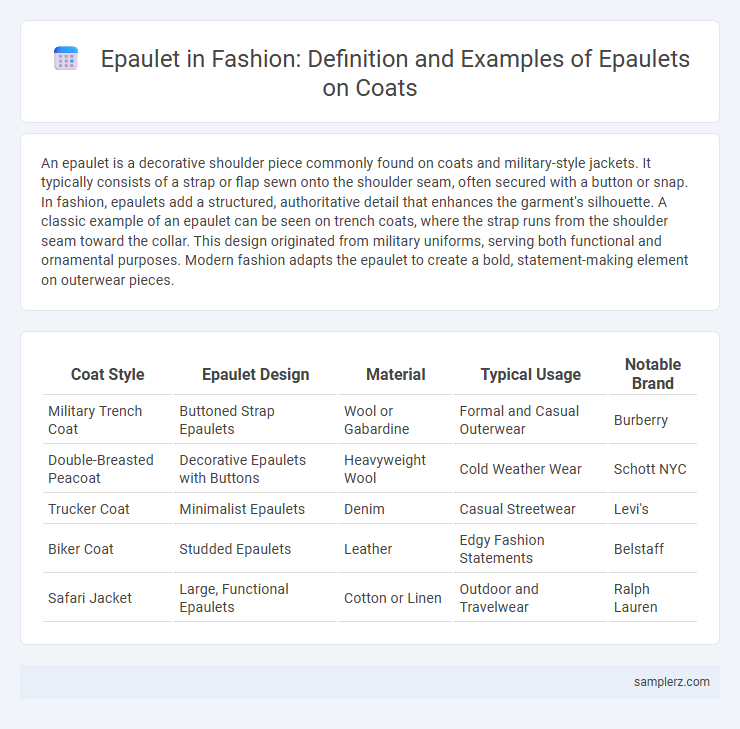An epaulet is a decorative shoulder piece commonly found on coats and military-style jackets. It typically consists of a strap or flap sewn onto the shoulder seam, often secured with a button or snap. In fashion, epaulets add a structured, authoritative detail that enhances the garment's silhouette. A classic example of an epaulet can be seen on trench coats, where the strap runs from the shoulder seam toward the collar. This design originated from military uniforms, serving both functional and ornamental purposes. Modern fashion adapts the epaulet to create a bold, statement-making element on outerwear pieces.
Table of Comparison
| Coat Style | Epaulet Design | Material | Typical Usage | Notable Brand |
|---|---|---|---|---|
| Military Trench Coat | Buttoned Strap Epaulets | Wool or Gabardine | Formal and Casual Outerwear | Burberry |
| Double-Breasted Peacoat | Decorative Epaulets with Buttons | Heavyweight Wool | Cold Weather Wear | Schott NYC |
| Trucker Coat | Minimalist Epaulets | Denim | Casual Streetwear | Levi's |
| Biker Coat | Studded Epaulets | Leather | Edgy Fashion Statements | Belstaff |
| Safari Jacket | Large, Functional Epaulets | Cotton or Linen | Outdoor and Travelwear | Ralph Lauren |
Historical Origins of Epaulets in Coats
Epaulets, originally used in military uniforms to denote rank and provide shoulder protection, became a prominent design feature in 18th and 19th-century coats. These ornamental shoulder pieces evolved from functional components in cavalry and infantry attire to stylish embellishments in civilian fashion. The transition highlights the influence of military aesthetics on modern outerwear design, preserving the epaulet's association with authority and structure.
Iconic Coat Styles Featuring Epaulets
Iconic coat styles featuring epaulets include the classic trench coat, renowned for its military-inspired design and shoulder straps that enhance both function and style. The pea coat, traditionally worn by sailors, often incorporates epaulets that add structure and a bold, authoritative silhouette. These designs exemplify how epaulets serve as distinctive decorative elements while reinforcing a coat's heritage and rugged elegance.
Military-Inspired Epaulet Designs
Military-inspired epaulet designs on coats often feature structured shoulder pads with prominent buttons or braiding, emphasizing a sharp, authoritative silhouette. These details replicate traditional military uniforms, incorporating elements like gold or brass accents, and layered fabric for added texture. Iconic examples include trench coats and double-breasted pea coats, where epaulets enhance both style and function.
Modern Trench Coats with Epaulets
Modern trench coats with epaulets showcase a blend of classic military design and contemporary style, featuring shoulder straps that add structure and a distinct silhouette. Epaulets on these coats are often crafted from durable materials like leather or reinforced fabric, enhancing both aesthetics and functionality by allowing for secure fastening of accessories. Fashion-forward brands incorporate oversized or decorative epaulets to elevate the trench coat's visual appeal while maintaining its timeless, utilitarian roots.
Classic Wool Coats Showcasing Epaulet Details
Classic wool coats featuring epaulet details blend timeless elegance with military-inspired design, often found on structured shoulders to enhance silhouette and add visual interest. These epaulets, typically made from the same wool fabric or leather, serve both decorative and functional purposes, reinforcing the garment's craftsmanship. Renowned brands like Burberry and Ralph Lauren incorporate epaulets in their wool coat collections, exemplifying refined style and durability.
Epaulet Placement and Styling in Outerwear
Epaulets are typically placed at the shoulder seam of coats, enhancing the structure and adding a military-inspired detail to outerwear. In styling, epaulets can be secured with buttons or left loose, creating either a polished or relaxed silhouette depending on the design. This feature not only emphasizes the shoulders but also allows for functional use in securing straps or accessories on trench coats and peacoats.
Celebrity Trends: Epaulet-Adorned Coats
Epaulet-adorned coats have surged in popularity among celebrities like Rihanna and Harry Styles, who incorporate these structured details to elevate their outerwear with a military-inspired edge. This trend highlights bold shoulder accents as a statement of power and style, seamlessly blending classic tailoring with contemporary fashion. High-end designers such as Burberry and Balmain frequently feature epaulets in their coat collections, reinforcing the accessory's status in celebrity street style and runway looks.
How Epaulets Enhance Coat Functionality
Epaulets on coats serve a practical purpose by securing items such as gloves or bags, preventing them from slipping off the shoulder. Their structured design also reinforces the shoulder area, adding durability to the coat's construction. By combining functionality with military-inspired style, epaulets elevate both the utility and aesthetic appeal of outerwear.
Epaulet Materials and Decorative Variations
Epaulets on coats commonly feature materials such as leather, wool, or metal accents, enhancing both durability and style. Decorative variations include embroidered patterns, button details, and ornate braiding, adding texture and visual interest to outerwear. These elements serve functional purposes while elevating the garment's overall aesthetic appeal.
Styling Tips for Wearing Coats with Epaulets
Epaulets on coats create a bold, structured silhouette that enhances shoulder definition and adds a military-inspired edge to any outfit. Pairing a coat with epaulets with slim-fit trousers and minimalist accessories balances the look by emphasizing the statement shoulders without overwhelming the silhouette. Choosing neutral or monochromatic colors for the coat allows the epaulets to stand out while maintaining a sophisticated and versatile style suitable for both casual and formal occasions.

example of epaulet in coat Infographic
 samplerz.com
samplerz.com